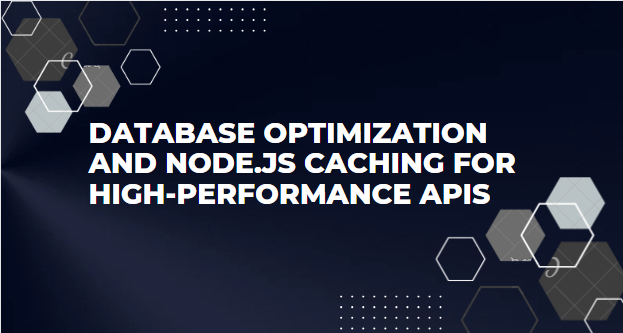The Power of Caching:
-
What is Caching? Caching is a technique that involves storing frequently accessed data in memory, reducing the need to fetch it from the original data source, which could be a database, an external API, or any other data store. This approach significantly improves response times and reduces server load.
-
Node.js Caching Libraries: Node.js offers a variety of caching libraries, with Redis and Memcached being among the most popular choices. These in-memory key-value stores provide lightning-fast data access, making them ideal for implementing caching in Node.js applications.
-
Cache Invalidation: While caching is a powerful tool, it's crucial to manage cache expiration and invalidation effectively. Cached data can become outdated, leading to incorrect responses. Implementing strategies to invalidate and update cached data when the source data changes is essential for maintaining data integrity.
Database Optimization:
-
Optimizing Database Queries: Database performance plays a pivotal role in API speed. By optimizing database queries, you can significantly reduce the time it takes to fetch and manipulate data. Techniques like indexing, query optimization, and proper schema design are essential.
-
N+1 Query Problem: Avoiding the N+1 query problem is critical. This issue occurs when an API retrieves a list of entities and then, for each entity, performs another query to fetch related data. This can lead to a large number of database requests, causing inefficiency and slow response times. Libraries like Sequelize for SQL databases and Mongoose for MongoDB help address this problem by executing optimized queries.
-
Connection Pooling: Managing database connections efficiently is essential for database optimization. Connection pooling allows you to reuse and manage existing connections rather than creating new ones for each API request. This reduces the overhead of establishing connections and helps prevent resource exhaustion.
Code Examples:
-
Node.js Caching with Redis: The article provides a code example that demonstrates how to set and retrieve data from a Redis cache. It showcases the simplicity and effectiveness of using a caching library like Redis in a Node.js application.
const redis = require('redis'); const client = redis.createClient(); // Set a key-value pair in the cache client.set('user:123', 'John Doe'); // Retrieve data from the cache client.get('user:123', (err, reply) => { if (err) throw err; console.log(reply); // Outputs 'John Doe' }); -
Database Optimization with Sequelize: Another code example illustrates how to use Sequelize, an Object-Relational Mapping (ORM) library for Node.js, to optimize database queries. It highlights how to efficiently fetch data from a database while avoiding the N+1 query problem.
const { Sequelize, DataTypes } = require('sequelize'); const sequelize = new Sequelize('database', 'username', 'password', { host: 'localhost', dialect: 'mysql' }); const User = sequelize.define('User', { name: { type: DataTypes.STRING }, // Add more fields here }); // Retrieve users with optimization User.findAll({ where: { name: 'John' } }).then((users) => { console.log(users); });
Conclusion:
Incorporating Node.js caching and database optimization techniques into your API development can lead to substantial improvements in performance. By reducing the load on your database, minimizing network latency, and ensuring efficient database queries, you can provide users with a faster and smoother experience. These strategies are essential for meeting the high-performance demands of modern web and mobile applications. This article encourages developers to fine-tune their caching and database optimization efforts to achieve the best results and keep their APIs running at peak performance.
